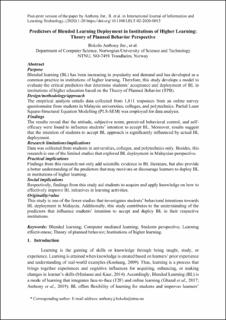Predictors of Blended Learning Deployment in Institutions of Higher Learning: Theory of Planned Behavior Perspective
Peer reviewed, Journal article
Accepted version

Åpne
Permanent lenke
https://hdl.handle.net/11250/2676765Utgivelsesdato
2020Metadata
Vis full innførselSamlinger
Originalversjon
10.1108/IJILT-02-2020-0013Sammendrag
Purpose
Blended learning (BL) has been increasing in popularity and demand and has developed as a common practice in institutions of higher learning. Therefore, this study develops a model to evaluate the critical predictors that determine students' acceptance and deployment of BL in institutions of higher education based on the theory of planned behavior (TPB).
Design/methodology/approach
The empirical analysis entails data collected from 1,811 responses from an online survey questionnaire from students in Malaysian universities, colleges and polytechnics. Partial least square–structural equation modeling (PLS–SEM) was employed for data analysis.
Findings
The results reveal that the attitude, subjective norm, perceived behavioral control and self-efficacy were found to influence students' intention to accept BL. Moreover, results suggest that the intention of students to accept BL approach is significantly influenced by actual BL deployment.
Research limitations/implications
Data were collected from students in universities, colleges and polytechnics only. Besides, this research is one of the limited studies that explored BL deployment in a Malaysian perspective.
Practical implications
Findings from this research not only add scientific evidence to BL literature but also provide a better understanding of the predictors that may motivate or discourage learners to deploy BL in institutions of higher learning.
Social implications
Respectively, findings from this study aid students to acquire and apply knowledge on how to effectively improve BL initiatives in learning activities.
Originality/value
This study is one of the fewer studies that investigate students' behavioral intentions toward BL deployment in Malaysia. Additionally, this study contributes to the understanding of the predictors that influence students' intention to accept and deploy BL in their respective institutions.